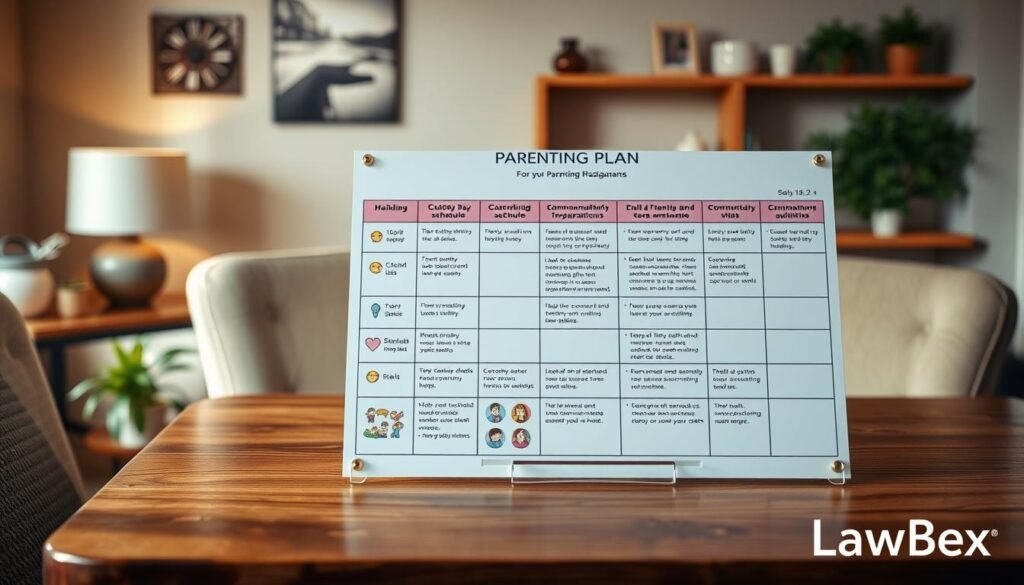Did you know over 95% of divorcing couples in the United States now choose family mediation? This shows how popular this approach is for solving family disputes. Family mediation is a way for families to work together to find solutions. It helps with issues like divorce, child custody, and dividing assets.
Unlike going to court, family mediation focuses on talking things out and finding common ground. It helps keep family relationships strong.
Key Takeaways
- Family mediation is a collaborative process that helps families resolve conflicts and navigate complex issues.
- It offers an alternative to traditional courtroom litigation, emphasizing open communication and compromise.
- Family mediation can address a wide range of issues, including divorce, child custody, asset division, and spousal support.
- The mediation process is facilitated by a neutral third-party mediator who guides the negotiations.
- Family mediation aims to preserve family relationships and find mutually agreeable solutions.
Introduction to Family Mediation
Dealing with family conflicts, like divorce or separation, can be tough and emotional. But, family mediation offers a new way to tackle these issues. It helps families talk better, find solutions, and agree on things that meet everyone’s needs.
Family mediation believes families can solve their problems on their own. A neutral mediator helps, making a safe space for open talks. This is different from the usual legal fights.
Looking into divorce mediation or trying to fix family conflict resolution? Family mediation has clear benefits. It focuses on talking, understanding, and finding common ground. This way, it keeps relationships strong, reduces stress and costs, and leads to a better future for everyone.
“Family mediation is not about winners and losers, but about finding solutions that work for everyone.”
When facing family challenges, think about family mediation. It’s a way to work together and build a better future. By choosing this path, you can shape a more loving and united family life.
Benefits of Family Mediation
Family mediation has many benefits over traditional legal fights. It’s cheaper because it’s faster and simpler than court. This makes it easier on the wallet for families to solve their problems.
It also keeps things private, which is key for keeping family bonds strong during tough times. Talking openly in a safe space helps families find solutions that fit everyone’s needs.
Cost-Effective Resolution
Mediation is a smart choice for saving money. It’s quicker and needs less legal help, cutting down costs. This makes it a good option for families looking for a practical and affordable way to solve their issues.
Confidential Process
Mediation keeps things private, which is vital for keeping family ties strong. It lets families work out their problems without the stress of being in court. This is especially helpful for sensitive topics like child custody or dividing assets.

“Mediation allows families to find tailored solutions that work for everyone involved, in a private and cost-effective manner.”
| Benefit | Description |
|---|---|
| Cost-Effective Resolution | Mediation is generally a more budget-friendly approach compared to traditional legal proceedings, as the process is typically faster and requires less legal expertise. |
| Confidential Process | Family mediation offers a private setting for discussing sensitive matters, allowing families to find solutions that work for them without public scrutiny. |
What is family mediation?
Family mediation is a way for families to work together to solve problems. It uses a neutral third-party mediator to help. This method focuses on talking openly and finding solutions that everyone can agree on.
It’s a way to resolve conflicts without going to court. Unlike court battles, family mediation is about working together. It helps families find agreements that meet everyone’s needs.
This process is flexible and can handle many issues. It’s great for dealing with things like child custody, asset division, and spousal support. Family mediation helps families create plans that fit their unique situations.
“Family mediation is a powerful tool for families seeking to resolve conflicts in a constructive and cooperative manner.”
Family mediation is useful for many challenges, like divorce or child-related disputes. It helps families stay connected and gives everyone a say in the outcome. With a skilled mediator, families can move forward with respect and understanding.
Family Mediation Process
The family mediation process is a way to help families deal with tough issues together. It starts with an initial consultation. Here, the mediator talks with the family to learn about their concerns and goals.
Initial Consultation
In the initial meeting, the mediator gets to know the family’s situation. This includes legal, financial, and emotional aspects. The mediator uses this info to figure out the best steps for the family mediation process.
Joint Mediation Sessions
After the first meeting, the family has joint mediation sessions. These sessions are a place where the mediator helps everyone talk and work things out. They focus on things like child custody, splitting assets, and spousal support.

“The family mediation process allows us to find solutions that work for everyone, without the added stress and expense of litigation.”
Using the family mediation process, families can skip the stress of court battles. They can work together to find solutions that benefit everyone.
Issues Addressed in Family Mediation
Family mediation helps solve many problems that come up during divorce and separation. It aims to find solutions that everyone can agree on. This is especially important for the well-being of any children.
Divorce and Separation
When couples decide to split, family mediation is key. It helps deal with the tough and emotional parts of divorce and separation. Some main issues that mediation can tackle include:
- Division of assets and property
- Determination of spousal support or alimony
- Child custody and visitation arrangements
- Child support agreements
- Co-parenting responsibilities and schedules
With a neutral mediator, couples can work together. They can find solutions that fit their family’s unique needs. This way, they often get better results than through court battles.
| Issue Addressed | Benefits of Mediation |
|---|---|
| Division of Assets | Allows for customized and flexible solutions, preserving more assets for the family |
| Spousal Support | Facilitates open discussions to reach fair and sustainable agreements |
| Child Custody | Prioritizes the best interests of the children and maintains parental involvement |
By tackling these issues addressed in family mediation, couples can move forward. They can do so with less conflict, keep family ties strong, and benefit everyone.
Child Custody and Visitation
Family mediation plays a key role in sorting out child custody and visitation. The mediator works with parents to create a detailed parenting plan. This plan covers who does what, when, and how decisions are made for the kids. It’s all about keeping the kids’ needs first and making sure they have a loving home.
Parenting Plans
A good parenting plan is a big win from family mediation. It looks at many things, like:
- Physical custody: Where the kids live and when
- Legal custody: Who makes big decisions for the kids
- Visitation rights: How and when each parent sees the kids
- Communication and cooperation: How parents will work together
- Dispute resolution: How to handle future disagreements
This parenting plan from family mediation ensures a safe and loving place for the kids. It also helps parents work together better.

“The goal of family mediation is to create a parenting plan that prioritizes the children’s best interests and maintains a healthy, collaborative relationship between the parents.”
Asset Division and Spousal Support
Family mediation is a great way to solve disputes over child custody and asset division. It also helps figure out spousal support, if needed. The mediator helps the family talk and negotiate to find fair agreements on property and support payments.
The mediator makes sure all marital property is found and valued. This includes homes, bank accounts, retirement savings, and personal items. The goal is to divide these assets fairly, considering each family member’s needs.
They also help with spousal support, or alimony. The mediator guides the parties to decide on support payments. They look at the financial situation of both spouses to find a fair arrangement.
By using family mediation for asset division and spousal support, families can skip the expensive and stressful court battles. The mediator’s help lets the parties make their own decisions. This leads to a smoother and more peaceful divorce process.
“Family mediation provides a structured and supportive environment for couples to navigate the complex financial aspects of divorce, ensuring a fair and equitable outcome for all involved.”
Family Mediation vs. Litigation
Family mediation is a different way to solve family problems compared to going to court. It’s not about fighting, but working together. The mediator helps everyone talk and find solutions they can all agree on. This way, families can keep their relationships strong.
Collaborative Approach
In family mediation, solving problems is a team effort. The mediator helps everyone find solutions that meet everyone’s needs. This approach can save families from the stress and cost of long court battles.
| Family Mediation | Litigation |
|---|---|
| Collaborative approach | Adversarial process |
| Mediator facilitates open communication | Parties are in opposition |
| Focuses on mutually acceptable solutions | Seeks to win or lose |
| Preserves family relationships | Can damage family relationships |
| Often more cost-effective | Can be financially burdensome |
Choosing family mediation vs. litigation means finding better ways to solve problems. Families can control the process and keep their relationships strong.
“Family mediation emphasizes a collaborative approach, where the mediator facilitates open communication and helps the family members work together to find mutually acceptable solutions.”

When is Family Mediation Appropriate?
Family mediation works well when family members want to solve their problems together. It’s especially helpful for issues like divorce, child custody, and dividing assets. This method helps families stay connected and find solutions that fit their needs.
Here are some situations where family mediation is a good choice:
- Divorce or separation: It helps couples deal with the end of their marriage without too much fighting.
- Child custody and visitation: Parents can make plans that focus on what’s best for their kids.
- Asset division: It helps families talk and agree on how to split up their property and money.
- Family conflict resolution: It’s a way to handle many family disputes, like disagreements over inheritance or elder care.
Family mediation works if everyone is willing to work together. It focuses on solving problems in a way that keeps families together. By choosing mediation, families can avoid the stress of court and have more control over their future.
| Mediation Advantages | Litigation Drawbacks |
|---|---|
| Confidential process | Public court proceedings |
| Customized solutions | One-size-fits-all court decisions |
| Preserved family relationships | Adversarial and confrontational |
| Cost-effective resolution | Expensive and time-consuming |
“Family mediation allows us to find creative solutions that address our unique needs and maintain a positive relationship, which is not always possible through the traditional legal system.”
Understanding when family mediation is right can help families choose a better way to solve their problems. It’s a collaborative approach that can lead to positive outcomes for everyone involved.
Choosing a Family Mediator
Choosing the right family mediator is key in mediation. We need to look at their qualifications and experience. This makes sure they can help us talk things out and find a fair solution.
Qualifications and Experience
Find mediators with training in family law and dispute resolution. They should know how to handle the emotional side of family fights. Also, check if they have a good track record of helping families settle their issues.
- Specialized training in family law and dispute resolution
- Extensive experience in facilitating family mediation sessions
- Demonstrated success in helping families reach mutually agreeable settlements
- Strong communication and negotiation skills
- Ability to maintain impartiality and create a safe, collaborative environment
By picking a mediator with the right qualifications and experience, we boost our chances of a good outcome. This is good for everyone involved.

“The right mediator can make all the difference in resolving family disputes effectively and amicably.”
| Qualification | Importance |
|---|---|
| Specialized training in family law | Ensures the mediator understands the legal and emotional complexities of family disputes |
| Extensive mediation experience | Provides the mediator with the skills and expertise to navigate complex negotiations |
| Proven track record of successful outcomes | Demonstrates the mediator’s ability to help families reach mutually agreeable settlements |
Family Mediation Laws and Regulations
Understanding family mediation laws is key. These laws differ by state in the U.S. It’s important for families to know their local rules and protections. Working with a skilled mediator or lawyer helps families follow the process well and reach agreements.
Family mediation agreements can be legally binding in many places. This means they can be enforced in court if needed. Knowing how to enforce these agreements is crucial, as the rules can change.
Mediation talks are usually kept private. Laws protect the confidentiality of these discussions. This is vital for families dealing with sensitive topics like child custody or money issues.
Some states have rules for who can be a family mediator. These rules help ensure mediators are well-trained and experienced. Knowing these rules helps families choose the right mediator.
Understanding family mediation laws and regulations is vital for families. It helps them resolve disputes and improve their relationships. By being informed and working with experts, families can get the most out of mediation.
“Informed families are empowered families when it comes to family mediation.”
Finalizing and Enforcing Agreements
After family members agree through mediation, the next step is to make these agreements official. This usually means creating a legally binding contract or court order. The enforceability of these agreements depends on the issues and laws in the area.
We suggest families work closely with their mediator and lawyer. This ensures the agreements are properly finalized and enforced. It protects everyone’s interests and provides a clear plan for the agreed terms.
By carefully finalizing and enforcing mediation agreements, families can trust that the solutions will be respected. This step is key to a stable and effective resolution of family issues.
